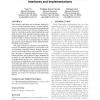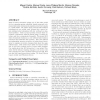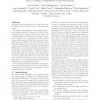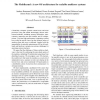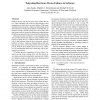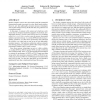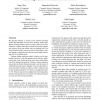150
click to vote
SOSP
2009
ACM
15 years 11 months ago
2009
ACM
Data-intensive applications are increasingly designed to execute on large computing clusters. Grouped aggregation is a core primitive of many distributed programming models, and i...
119
click to vote
SOSP
2009
ACM
15 years 11 months ago
2009
ACM
Bugs in kernel extensions remain one of the main causes of poor operating system reliability despite proposed techniques that isolate extensions in separate protection domains to ...
124
click to vote
SOSP
2009
ACM
15 years 11 months ago
2009
ACM
Commodity computer systems contain more and more processor cores and exhibit increasingly diverse architectural tradeoffs, including memory hierarchies, interconnects, instructio...
115
click to vote
SOSP
2009
ACM
15 years 11 months ago
2009
ACM
Hardware devices can fail, but many drivers assume they do not. When confronted with real devices that misbehave, these assumptions can lead to driver or system failures. While ma...
154
click to vote
SOSP
2009
ACM
15 years 11 months ago
2009
ACM
Modern computer systems have been built around the assumption that persistent storage is accessed via a slow, block-based interface. However, new byte-addressable, persistent memo...
105
click to vote
SOSP
2009
ACM
15 years 11 months ago
2009
ACM
We describe Neutron, a version of the TinyOS operating system that efficiently recovers from memory safety bugs. Where existing schemes reboot an entire node on an error, Neutron...
111
click to vote
SOSP
2009
ACM
15 years 11 months ago
2009
ACM
Faulty device drivers cause significant damage through down time and data loss. The problem can be mitigated by an improved driver development process that guarantees correctness...
SOSP
2009
ACM
15 years 11 months ago
2009
ACM
We revisit the problem of scaling software routers, motivated by recent advances in server technology that enable highspeed parallel processing—a feature router workloads appear...
135
click to vote
SOSP
2009
ACM
15 years 11 months ago
2009
ACM
Reproducing bugs is hard. Deterministic replay systems address this problem by providing a high-fidelity replica of an original program run that can be repeatedly executed to zer...
